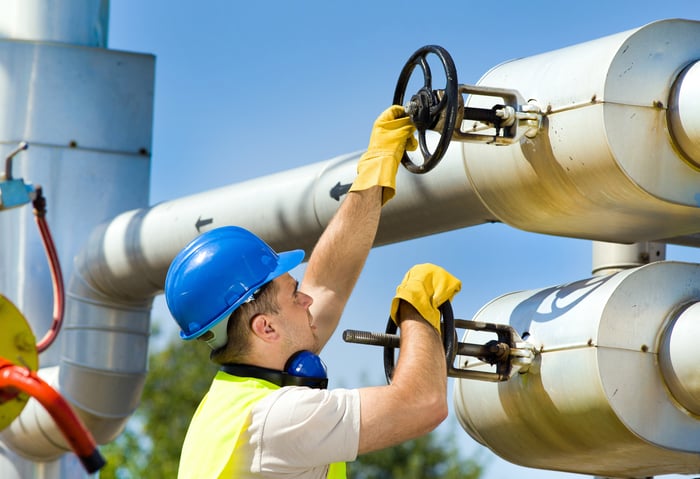If you are considering investing in the midstream sector, Kinder Morgan (KMI -0.64%) will probably be one of the standouts. With a nearly $40 billion market cap and a geographically diverse business, it is an industry leader. Add in a 6.3% dividend yield, and there's a lot to like here. But you should get to know the company a little more before you jump aboard. Here's why.
Buy Kinder Morgan?
Touching on some of the positives up front, Kinder Morgan owns midstream assets that would be virtually impossible to replace or displace. Its business spans across the United States and includes pipelines, storage, transportation, and processing assets. Roughly 64% of the company's operations are tied to natural gas, a key transition fuel as the world shifts toward lower-carbon energy sources. The rest is spread across refined products (26%) and CO2 (10%).

Image source: Getty Images.
There are other large midstream companies, but Kinder Morgan boasts that it owns the "largest natural gas transmission network" and is the "largest independent transporter of refined products" and the "largest independent terminal operator." Given the vital nature and cash-flow-generating capacity of midstream assets, Kinder Morgan is very well positioned within the energy sector.
It also has $3 billion in capital spending plans that will keep the portfolio expanding through at least 2026. As those assets come on line, they will bolster cash flow and enhance the company's dividend-paying ability. Meanwhile, Kinder Morgan has been working to reduce leverage, with its debt-to-EBITDA (earnings before interest, taxes, depreciation, and amortization) ratio falling 30% from its peak levels in 2018.
KMI Financial Debt to EBITDA (TTM) data by YCharts
Now add in a dividend that has been increased each year for six years, an investment-grade balance sheet, and a 6.3% yield. It's clear there are very good reasons to like Kinder Morgan.
Hold Kinder Morgan?
If you own Kinder Morgan, and are comfortable with the company and its dividend (more on this below), there's no reason to sell it. It looks extremely well positioned today to provide investors with slow and consistent growth backed by a largely fee-based portfolio of vital energy infrastructure. The yield will likely make up the lion's share of your returns, but you probably went in knowing that. In fact, if you are a dividend investor looking to live off of the income your portfolio generates, you may have bought it specifically for the dividend. But here's where a bit of a complication comes in.
Sell Kinder Morgan?
Kinder Morgan cut its dividend by 75% in 2016. It is in much better financial shape today than it was back then and the dividend is back in growth mode. However, in late 2015, the company was telling investors to expect a dividend increase of as much as 10% in 2016. What they got instead was a giant shock.
When the dividend started to grow again, management laid out a plan for large annual dividend boosts through 2020. But when 2020 rolled around investors were greeted with a 5% dividend raise instead of the 25% hike they had been promised. In both cases, Kinder Morgan probably made the right move for the company, but it still failed to live up to key promises it made.
KMI Dividend Per Share (Quarterly) data by YCharts
It would be very reasonable for more conservative investors to have trust issues around what is, most likely, the key reason to buy the stock: the dividend. You should avoid Kinder Morgan if its dividend track record is an issue for you. There are plenty of other high-yield midstream companies you can buy, such as Enbridge (ENB -1.21%) and Enterprise Products Partners (EPD 0.45%), that have increased their dividends even through difficult times in the energy industry. (Note in the graph above that Enbridge pays dividends in Canadian dollars, so the value of the dividend changes with exchange rates. Enbridge has increased its payout for 29 consecutive years.)
Kinder Morgan is fine if you know and are OK with the history
Kinder Morgan is one of many midstream companies you could buy, and it isn't the highest-yielding option. But it has built a large business with many things going for it. The yield is attractive and there's a high likelihood that dividend growth will continue in the near term based on the company's investment plans. If you can forgive past misgivings, there's no particularly strong reason why you shouldn't buy it or continue to hold it. However, historically speaking, Kinder Morgan has fallen short of peers on the dividend front. If that concerns you, given that the dividend yield is one of the main reasons to like the stock, you should probably look at midstream companies with better track records, like Enterprise and Enbridge.







